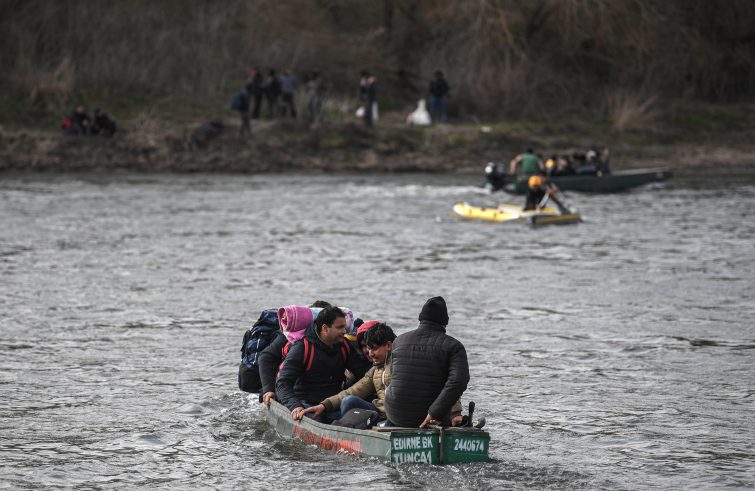
Once again, Europe is caught in the grips of a twofold challenge: Covid-19, for which the European Commission attempted to formulate a response; and the tragic situation of refugees drawn by Erdogan into Greece and Bulgaria. Yesterday EU top officials were “on site” to verify the situation, pledging humanitarian interventions, and to exert political pressure on Ankara. But the overall picture is dramatic. SIR addressed the situation with Piero Graglia, Professor of the History of European Integration at the University of Milan.
 Professor, the latest reports are worrying in many ways. What is your opinion?
Professor, the latest reports are worrying in many ways. What is your opinion?
We are facing a psychosis and a structural problem: in both cases, the EU is essentially unarmed, since weapons (in the political sense) should be supplied by the governments of the Member States and this is not being done. Obviously, while States are reluctant to hand over sovereignty in order to tackle problems of European proportions, such as health care in times of pandemic and immigration, they continue complaining that “Europe” is not intervening, as if “Europe” were some kind of magical or mysterious entity. In the case of the attitude of Turkey and the Syrian refugees pushed towards Greece and Bulgaria, we are facing outright blackmail, to which the Union should respond collectively considering it as an act of aggression against each Member State. But even in this case, there is little that the Union can do, as it lacks the capacity to exercise its own foreign policy, given the vetoes of the Member States. In any event, we are confronted with an underlying problem, namely Member States’ power to undermine any measures that the Union might take as a single player on the international stage. This makes Member States and their claim of sovereignty in all matters, part of the problem, not the solution.
Every single day the EU is requested to take action in the face of difficulties afflicting the EU and its Member States: just consider the recent economic crisis, followed by the migratory influx from Africa and the Middle East, and the terrorist threats… Today, public health is at stake alongside with, once again, the immigration problem – against the backdrop of political instability at the gates of Europe. In which areas of public life does the European Union have actual competence?
First of all, we should all agree on what is meant by public health. Yesterday I read an news agency report from the United States quoting Bloomberg, one of the possible candidates for the presidency of the United States for the Democratic Party. For Bloomberg, the massacres perpetrated in the United States by individuals armed to the teeth is a “public health” issue. For us it would be a serious problem of public order. If, however, we reason in European and not American terms, health issues, education and research, foreign policy, that is, issues which are clearly supranational in terms of scale and resources to be deployed, do not fall within EU jurisdiction. Just consider the importance of European higher education institutions being able to dialogue with each other and recognise, for example, the qualifications obtained in the various EU countries. We made tremendous progress in this direction but we are still far from achieving systematic recognition. The same applies to foreign policy, which has always been the responsibility of national governments, and the coronavirus emergency shows that there may be European guidelines in the health sector too, but there is no real EU capacity for action. However, the EU has broad competences in the areas of currency, economic policy, international trade, environmental protection ( restricted to the possibility of collecting national data) and the coordination of police operations against organised crime. But it lacks key competences, for example in the field of defence, tax harmonisation and in those areas, already mentioned, where Member States are stubbornly reluctant to relinquish competences.
What’s the impact of all this?
This results in an unbalanced system marked by great economic and commercial integration but only minimal integration from a political perspective, while maintaining the possibility of unfair competition among States in terms of tax policy aimed at attracting investment. This asymmetry exposes the EU to continuous attacks by nationalist populism, which puts all the blame on the Union, while at the same time advocating the return to a Europe divided into independent and sovereign states given EU incapacity. Such political schizophrenia fuels nostalgia for far right claims that we will pay dearly, very dearly, in terms of instability, social disintegration, new forms of nationalism.
With regard to the competences assigned to the EU by the Treaties, does it have sufficient means and resources for effective and lasting responses? The current debate on the Multiannual Financial Framework would suggest that the States are asking a lot from Brussels, other than tightening the purse strings.
It’s not only a matter of EU competences on supranational issues, it also means having sufficient resources to tackle them. The EU budget for 2020 is €168 billion. This sum must cover spending for the environment, support to European farmers and producers, promote industrial defence projects (yet without a European army), develop cooperation projects between Member States under the so-called “European funds”, and finally tackle migratory emergencies (with only €2.36 billion). In this sense, the United Kingdom’s exit was an opportunity to be seized. In fact, the Country that historically worked against the idea of the EC/EU having more resources to intervene with common policies, has left the EU. The new 7-year budget 2021-2027 should have been negotiated with boldness and foresight, but the path of hesitation was chosen instead. Sovereignists, nationalists and populists want a weak Union in order to effectively undermine it. Therefore, in order to avoid clashes with those States opposing budgetary increase, the proposal of 1.1% of the bloc’s GDP was replaced by joint spending at 1.069% of joint GDP. But some Member States would rather put the limit at 1%, only to complain that the EU is not doing enough for them and for all Country… If we do not overcome this climate of political schizophrenia, of angry frustration, yet impotent and without proposals, I’m afraid that the EU will be forced to scale down its global ambitions, to the delight of its international enemies: the United States, Russia and China. And obviously with the satisfaction of local nationalists, veritable fifth columns of external adversaries (or competitors, as the case may be), even though disguised as genuine patriots.
One last question. In your view, as a historian and expert on the EU, do you believe that that the history of European integration has something to teach us about today’s challenges?
History is a lousy teacher: she gives grades before imparting the lesson. We never learned the lesson of the problems caused by Europe divided into sovereign States, despite the fact that we have been studying it in vain for seventy years. Some of today’s challenges (immigration and the problem of refugees from war zones, health emergencies, economic and commercial globalization) clearly have a dimension that is unattainable by individual States. Viruses penetrate even the most heavily guarded borders; migratory flows are unstoppable, in addition to being a de facto resource throughout history; economic activities occur through networks that transcend national governments, constantly competing with each other to be ” recipients” of capital and economic activities. The EU is the answer to these problems, to give meaning to economic and political integration and to respond to the principle of solution implemented as efficiently as possible. European and global problems can’t be solved at national level. It’s so obvious that having to repeat that the EU is not an outsider, an enemy of Member States is all the more absurd. The EU is the States that comprise it, and these States determine its nature, its policies, its behaviour, even its resources. In the past seventy years the history of European integration has shown that some EU institutions, such as the European Parliament or the Court of Justice, have struggled to erode the competences of the Member States and became autonomous, making the integration process grow and transforming it into a fascinating process, an unprecedented political workshop.
What’s your conclusion?
The lesson learned from this journey is that solutions move upwards, towards the supranational level, not downwards, reverting to “small homelands”. The latter continues to be an important dimension, culturally and ideologically, but substantially limited in its capacity for action. Political action at the national level must go hand in hand with action at the supranational level, thereby making subsidiarity and the “international division of responsibility” to tackle the various challenges, a concrete approach. This was said in 1937 by a “dangerous subversive”, Lord William Beveridge, preposterous that it still should be repeated today to make it enter the mindset of the “new” nationalists stuck in nineteenth century pre-war period: the First, not the Second!









